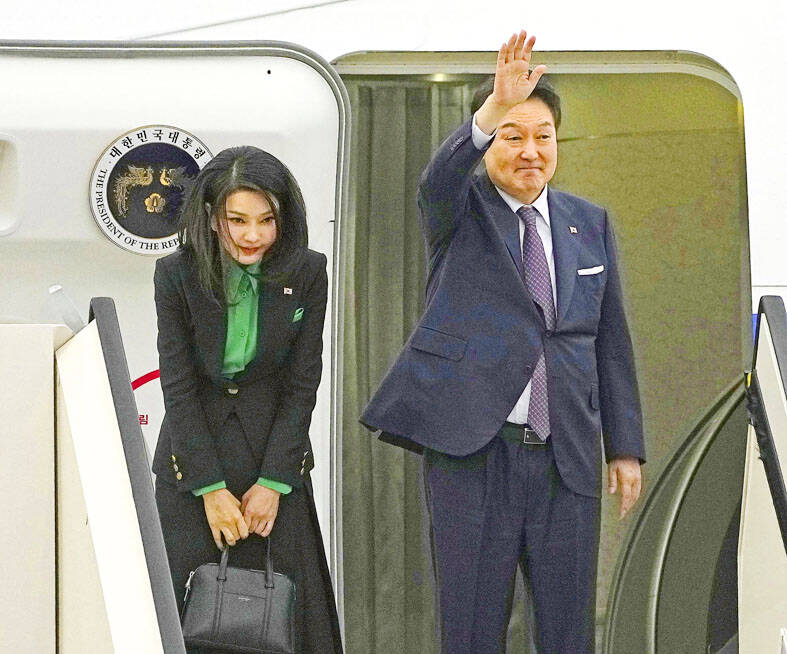South Korea is planning to fully implement a key military intelligence-sharing pact with Japan, a South Korean Ministry of National Defense official said yesterday, amid the two countries’ efforts to thaw long-frozen relations and renew diplomacy to counter Pyongyang.
At a fence-mending summit on Thursday, South Korean President Yoon Suk-yeol and Japanese Prime Minister Fumio Kishida agreed to turn the page on a bitter dispute over Japan’s use of forced labor during World War II.
Yoon, who has been keen to end the spat and present a united front against nuclear-armed North Korea, traveled to Japan to meet Kishida at the first such summit in 12 years.

Photo: EPA-EFE
Yoon told Kishida he wanted a “complete normalization” of a 2016 military agreement called the General Security of Military Information Agreement (GSOMIA), which enables the two US allies to share military secrets, particularly over Pyongyang’s nuclear and missile capacity.
Following the summit, the South Korean Ministry of Foreign Affairs was asked “to proceed with the needed measures to normalize the agreement,” said a defense ministry official, who declined to be named.
The foreign ministry is expected to send a formal letter to its Japanese counterpart soon, the official added.

Photo: AP
Seoul had threatened to scrap GSOMIA in 2019 as relations with Tokyo soured over trade disputes and a historical row stemming from Japan’s 35-year colonial rule over the Korean Peninsula.
The US at the time said that calling off the pact would only benefit North Korea and China.
Hours before it was set to expire, South Korea agreed to extend GSOMIA “conditionally,” but warned it could be “terminated” at any moment.
Confronted with Pyongyang’s growing aggression and flurry of missile tests, the neighbors have increasingly sought to bury the hatchet. The increasing security challenge was thrown into sharp relief just before Yoon’s arrival in Tokyo on Thursday as North Korea test-fired what it said was its most advanced intercontinental ballistic missile.
Separately, the US on Friday accused China of attempting to hide North Korea’s atrocities from the world by blocking the Web cast of an informal meeting of UN Security Council members on accusations of human rights abuses by Pyongyang.
“Some council members are all too willing to shield the regime from accountability,” US Ambassador to the UN Linda Thomas-Greenfield told the meeting in a veiled reference to China and Russia.
China and Russia have said that the 15-member Security Council, which is charged with maintaining international peace and security, should not discuss human rights issues.
Thomas-Greenfield said North Korea’s nuclear and ballistic missile programs were “inextricably linked to the regime’s human rights abuses.”
“The pursuit of weapons of mass destruction always trumps human rights and humanitarian needs of its people,” she said. “[North Korean leader] Kim Jong-un has chosen ammunition instead of nutrition, missiles over humankind.”

TRAGEDY STRIKES TAIPEI: The suspect died after falling off a building after he threw smoke grenades into Taipei Main Station and went on a killing spree in Zhongshan A 27-year-old suspect allegedly threw smoke grenades in Taipei Main Station and then proceeded to Zhongshan MRT Station in a random killing spree that resulted in the death of the suspect and two other civilians, and seven injured, including one in critical condition, as of press time last night. The suspect, identified as a man surnamed Chang Wen (張文), allegedly began the attack at Taipei Main Station, the Taipei Fire Department said, adding that it received a report at 5:24pm that smoke grenades had been thrown in the station. One man in his 50s was rushed to hospital after a cardiac arrest

SAFETY FIRST: Double the number of police were deployed at the Taipei Marathon, while other cities released plans to bolster public event safety Authorities across Taiwan have stepped up security measures ahead of Christmas and New Year events, following a knife and smoke bomb attack in Taipei on Friday that left four people dead and 11 injured. In a bid to prevent potential copycat incidents, police deployments have been expanded for large gatherings, transport hubs, and other crowded public spaces, according to official statements from police and city authorities. Taipei Mayor Chiang Wan-an (蔣萬安) said the city has “comprehensively raised security readiness” in crowded areas, increased police deployments with armed officers, and intensified patrols during weekends and nighttime hours. For large-scale events, security checkpoints and explosives

A car bomb killed a senior Russian general in southern Moscow yesterday morning, the latest high-profile army figure to be blown up in a blast that came just hours after Russian and Ukrainian delegates held separate talks in Miami on a plan to end the war. Kyiv has not commented on the incident, but Russian investigators said they were probing whether the blast was “linked” to “Ukrainian special forces.” The attack was similar to other assassinations of generals and pro-war figures that have either been claimed, or are widely believed to have been orchestrated, by Ukraine. Russian Lieutenant General Fanil Sarvarov, 56, head

PUBLIC SAFETY: The premier said that security would be tightened in transport hubs, while President Lai commended the public for their bravery The government is to deploy more police, including rapid response units, in crowded public areas to ensure a swift response to any threats, President William Lai (賴清德) said yesterday after a knife attack killed three people and injured 11 in Taipei the previous day. Lai made the remarks following a briefing by the National Police Agency on the progress of the investigation, saying that the attack underscored the importance of cooperation in public security between the central and local governments. The attack unfolded in the early evening on Friday around Taipei Main Station’s M7 exit and later near the Taipei MRT’s Zhongshan